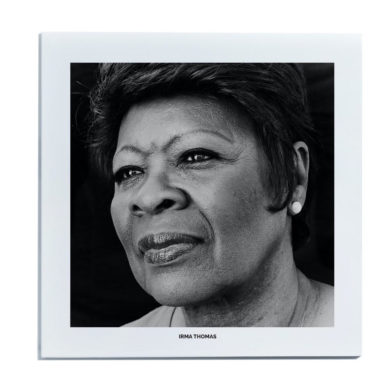It’s a good moment for Irma Thomas records. Last year Craft Records released a vinyl-only 2-LP remaster of Thomas’ iconic After the Rain album, and now Newvelle drops her first new recording in years. Newvelle records is a French company that issues limited edition audiophile records in groups at premium collector’s prices. The company’s vision is a cross between the pristine high-resolution recordings by Manfred Eicher at ECM and the scarcity of Michael Cuscuna’s archived limited edition boxes on the Mosaic label, which typically sells out everything in stock. The concept is aimed at the discriminating fan or well-heeled collector. This four-album collection covers New Orleans artists and is only available as a group, priced at $200. I’m reviewing the albums individually in order of their catalog numbers, but you can only buy them as a group direct from the company.
 Irma Thomas is well-known as the Queen of New Orleans R&B but she is much more than that, as anyone who has seen her performances at the Gospel Tent during Jazz Fest can attest. This record is something different, an unusual (for her) collection of pop-jazz and R&B that showcases another aspect of Thomas’ talents, touching on songs by J.J. Cale alongside choice R&B and Great American Songbook selections and evoking comparisons to more contemporary vocalists like Norah Jones, Diana Krall and Amy Winehouse. Irma is accompanied on the set by drummer Johnny Vidacovich and percussionist Alfred “Uganda” Roberts (now deceased), who weave a subtle layer of Latin-tinge rhythms to much of the record. Kyle Roussel does exceptional work accompanying Thomas on piano, Wurlitzer and B3 organ. Paul Defiglia adds electric and acoustic bass, Stephen Daley plays electric and pedal steel guitar. The big-sounding band is filled up with a three-piece brass section and a vocal chorus.
Irma Thomas is well-known as the Queen of New Orleans R&B but she is much more than that, as anyone who has seen her performances at the Gospel Tent during Jazz Fest can attest. This record is something different, an unusual (for her) collection of pop-jazz and R&B that showcases another aspect of Thomas’ talents, touching on songs by J.J. Cale alongside choice R&B and Great American Songbook selections and evoking comparisons to more contemporary vocalists like Norah Jones, Diana Krall and Amy Winehouse. Irma is accompanied on the set by drummer Johnny Vidacovich and percussionist Alfred “Uganda” Roberts (now deceased), who weave a subtle layer of Latin-tinge rhythms to much of the record. Kyle Roussel does exceptional work accompanying Thomas on piano, Wurlitzer and B3 organ. Paul Defiglia adds electric and acoustic bass, Stephen Daley plays electric and pedal steel guitar. The big-sounding band is filled up with a three-piece brass section and a vocal chorus.
The results offer a recommendation of Newvelle’s audiophile intent. Recorded with care by Misha Kachkachishvili at Esplanade Studios in New Orleans and mastered by Alex DeTurk at The Bunker Studio in Brooklyn, Thomas sounds like a precious jewel placed in an exquisite setting. The whole package is a work of art, from the striking black and white cover photo by Daymon Gardner, a head shot portrait in meticulous detail that seems to reveal something deep and essential in Thomas’ character; to the art museum quality graphic design and the opaque pearl vinyl disc that graces your turntable like a designer outfit.
Put down the tone arm and there is Irma caressing the melody to the Billy Myles chestnut “My Love Is,” a song that has also been covered by Krall. Thomas’ great interpretation is sultry, easy-swinging and melodically precise, and Roussel adds a tidy piano solo.
On Brook Benton’s slow R&B groove “I Don’t Know” Thomas takes her time developing the story while every lick behind her is perfectly placed. She builds the tension to a slow boil, then delivers the high notes with authority. Roussel submits a well-placed organ solo. Thomas is in her wheelhouse on the slow-rolling Chuck Willis ballad “It’s Too Late” and the feisty tale “Picture on the Wall.” She handles the exotic melody of “Perfidia” with aplomb, and nails the languid, regretful 1940 Russ Morgan classic “So Long.” Vidacovich’s drumming on this is so perfect, almost pianistic in the shape of the accents he uses to support Thomas.
Cale’s “Don’t Go to Strangers’ is an absolute tour-de-force in Thomas’ hands as the band turns Cale’s Tulsa groove towards a New Orleans R&B direction. Vidacovich and Uganda cook it low and slow on the title track, then Johnny V taps out a heartbeat rhythm on Cale’s “Crying Eyes” before turning with a flourish onto the broad, open boulevard of “Second Chance” with a dancing second line rhythm that sets the tone for Thomas’ saucy reading of this tale of cold vengeance.
The coda of this wonderful recording comes with Thomas covering the timeless 1962 hit for Ruby and the Romantics, “Our Day Will Come,” a drummer-less ballad about under-age love elevated from the teenage angst that it originally served into a timeless lament for love-lost heartache.




